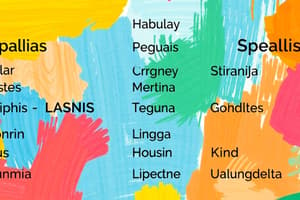Podcast
Questions and Answers
What does 'pongo' mean in English?
What does 'pongo' mean in English?
- to put, to place (correct)
- to say, to tell
- to leave, to go out
- to do, to make
What is the meaning of 'hago'?
What is the meaning of 'hago'?
- to do, to make (correct)
- to leave, to go out
- to come
- to have
What does 'salgo' mean?
What does 'salgo' mean?
- to have
- to hear
- to leave, to go out (correct)
- to bring, to carry
What is the English translation of 'traigo'?
What is the English translation of 'traigo'?
What does 'digo' mean?
What does 'digo' mean?
What is the meaning of 'tengo'?
What is the meaning of 'tengo'?
What does 'vengo' mean in English?
What does 'vengo' mean in English?
What is the meaning of 'oigo'?
What is the meaning of 'oigo'?
Flashcards are hidden until you start studying
Study Notes
Yo Go Verbs
- Pongo: Translates to "to put" or "to place" in the first-person singular form (Yo).
- Hago: Means "to do" or "to make" when using the first-person singular (Yo).
- Salgo: Refers to "to leave" or "to go out" in the first-person singular (Yo).
- Traigo: Denotes "to bring" or "to carry" in the first-person singular (Yo).
- Digo: Represents "to say" or "to tell" in the first-person singular (Yo).
- Tengo: Means "to have" in the first-person singular (Yo).
- Vengo: Translates to "to come" in the first-person singular (Yo).
- Oigo: Refers to "to hear" in the first-person singular (Yo).
Key Notes
- All listed verbs are irregular and specifically used in the first-person singular form in the present tense.
- Recognizing these verbs is essential for expressing actions performed by oneself.
- Understanding these verbs enhances conversational abilities in Spanish.
Studying That Suits You
Use AI to generate personalized quizzes and flashcards to suit your learning preferences.




